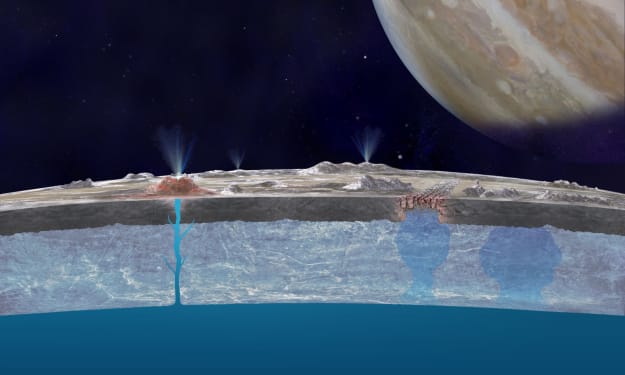
“You’re only 73. You’re much too young to be thinking about something like this.” It was his wife talking, and she sounded worried, as she had since the topic had first come up, as she had since she had first found the slim black notebook in which he had written the address of the clinic. “This is something that people in assisted living do, or even old folks in nursing homes. You’ve only been retired a few years.” She had made these points before, and -- perhaps realizing that he was not giving her his full attention -- she began to wander off and speak more to herself than her husband. “Some people want to relive some sort of sexual experience,” she said. “At least that you could understand.”
He gestured toward the brightly colored pamphlet on the table. “It’s totally safe,” he said, “and not even that expensive anymore. I have the inheritance now, from my cousin. I mean, all that money just suddenly turned up. More than $20,000. We can certainly afford the procedure. Listen – the shorter and simpler the memory is, and the more recent, the easier it is to recover. Oscar’s only been dead three weeks.” Oscar had been his cat. Everyone else in the family had a different understanding as to why the cat had been named Oscar; but, for him, the cat had been named after Oscar Wilde, and the orange tabby’s long happy life had been a reward to the reincarnated Wilde for all the playwright had endured in his human form. “The sooner I go in, the better. I’ll only be in there for an afternoon at most. And the operation leaves no visible mark.”
She turned to face him, and decided not to repeat all of her earlier arguments about how the money would be better spent on real things, on vacation, on travel. “If you insist on going through with this,” she said, “you have to promise me something. You’ll never do it in front of other people. I couldn’t bear it if other people were watching you.”
He promised her.
They lived in a well-to-do urban neighborhood. They had long gotten used to seeing their fellow pedestrians, navigating the sidewalk, engaged in prolonged and animated conversations with people on the other end of a cell phone signal. In recent years, more and more of the pedestrians could be seen walking dogs that weren’t there. One or two even seemed to be carrying invisible cats, which made him smile. He was not alone. It took him only a few minutes to stroll to the clinic. They had arranged to call his wife when she was done so she could stroll him home.
“As I’m sure you understand,” the doctor said. “Our initial scan involves no physical contact at all. Even when we implant the stimulation chip, it sits invisibly and painlessly on the skull, under the skin. And it never needs maintenance or recharging. Until you enter the code on the remote switch, you will never know the stimulator is there.” Even as the doctor spoke, her gentle hands were positioning the equipment around his head. “What we’ll be looking for,” the doctor went on, “is a clear and distinct memory that contains the substance you’re looking for, but is unconnected to anything else. Take your time, and be sure you’re picking the memory you really want. You said this was an orange tabby cat?”
“Yes,” he said, being careful not to move his head. He had been instructed to keep as still as possible.
“I have him running across the room to jump up on your shoulder,” the doctor said. “You’re sitting in a large comfortable armchair.” The stored sensations of his aging body, with its labored breathing, were, of course, unfamiliar to the doctor; but she had been trained to disregard those, as they would be second-nature to the patient. “He’s putting his two front paws around your neck and hugging you. I see at least two dozen of these hugs. He’s rubbing his face against yours.”
Tears were running down his face. He was also being hugged by Oscar, hugged again and again. “This would happen every evening,” he said.
“Yes, I can see that,” the doctor said. “Then he lies down in your arms and you rub his tummy. You talk to him in baby-talk and rock him. That’s some of the loudest purring I’ve ever heard. Now, I’ve got a memory here that’s very recent and well defined. There’s no background noise or music. No distractions. The entire sequence – running to you, jumping up on your shoulder, hugging your neck, getting his tummy-rub – is in one uninterrupted piece. I’ll play it for you.”
“Yes, please.” His tears began to flow again. When the memory was done, it was terrible to wake up and realize that Oscar was no longer in his arms. He begged for her to play the memory again. She did. But when his broken voice sobbed for yet another rendition, something warned her off.
“Sit back in the chair,” she said. “Let’s get this equipment off you. Now relax. Breathe deeply. I want to see you get back some color back into your face.” She offered him a glass of cold water, and his color improved. She checked his pulse before going on. “I put the chip in while you were petting the cat the last time. Now, two things. When you get home, sit in your favorite armchair before typing the code into the remote for the stimulator. It will be best if your background sensations match up with what you’re remembering. Second, I want you to remember not to overdo this. Call up the memory one or twice, every now and then. I want you to enjoy this memory for a long time to come.”
He knew he would be able to follow the first instruction. He wasn’t so sure about the second.






Comments
There are no comments for this story
Be the first to respond and start the conversation.